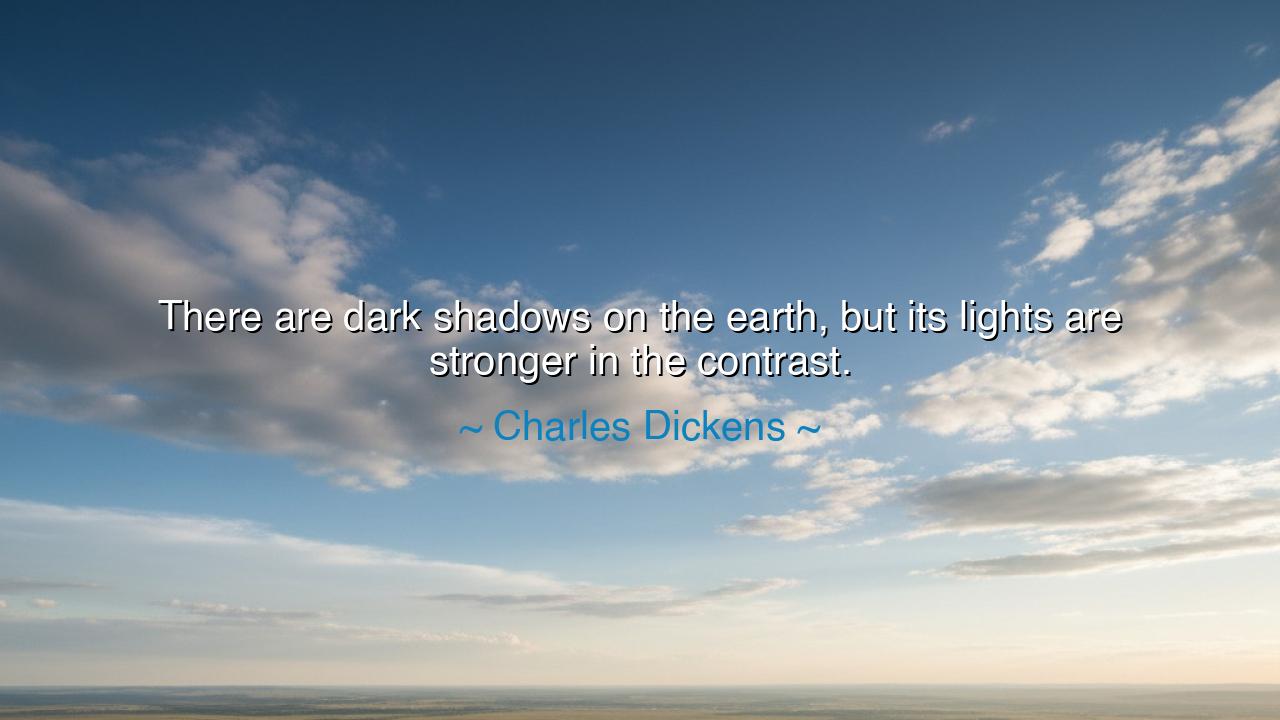
There are dark shadows on the earth, but its lights are stronger






In the words of Charles Dickens: “There are dark shadows on the earth, but its lights are stronger in the contrast.” This is not a simple reflection on the interplay of night and day; it is a revelation of the human spirit. For in every age, in every heart, the shadow walks side by side with the light. The ancients knew this truth: without darkness, the stars could not be seen. Without hardship, the triumph of the soul could not blaze forth. Dickens, a man who gazed deeply into the wounds of his century, declared this truth with clarity—that the darkness is never the final word, for it is the light that defines it, conquers it, and gives it meaning.
Think upon this: the shadow itself has no power. It is but the absence of light. It feeds only when the lamp is dim, when the spirit wavers. Yet the smallest flame pierces the deepest night, and even one candle can defy a cavern of gloom. Thus, when Dickens speaks of the lights being stronger, he reminds us that goodness, hope, and love are not fragile things; they are unconquerable forces that shine all the brighter because of the darkness that surrounds them.
Consider the story of Winston Churchill and the people of Britain during the Second World War. The cities burned under bombardment, fear stalked every street, and despair threatened to choke the breath of the nation. Yet it was in this abyss that courage arose. Churchill’s voice rang out, declaring that the island would never surrender, and ordinary men and women found within themselves a radiance of resilience. The dark shadows of war only sharpened the brilliance of their resolve. And when victory came, it was brighter precisely because of the depth of the night from which they had emerged.
So it is with all human life. The contrast between grief and joy, sorrow and hope, despair and triumph, is the very loom upon which the fabric of our souls is woven. To live without hardship would be to live without depth, to never taste the sweetness of deliverance after bitterness. The light is not weakened by the darkness—rather, it is made glorious through it, for it shows itself unconquerable, eternal, and pure.
But hear this also: the shadow serves a sacred purpose. It teaches the heart the value of what is good. It awakens the spirit to the truth that light must be cherished, tended like a sacred flame. When darkness comes, it does not come to destroy us, but to call forth the strength of our inner fire. Those who learn this do not fear the night, for they know it is but a setting in which their own light may shine.
What, then, is the lesson? When you find yourself in the valley of shadows—whether of sorrow, loss, or doubt—do not despair. Lift your gaze toward the light, however faint it may seem. Remember that the very presence of darkness is the stage upon which your strength, your love, and your courage may shine with greater brilliance. Do not curse the shadow; instead, let it sharpen your hunger for the dawn.
In practice, let each soul do this: guard a flame within you. Nurture kindness when cruelty tempts, practice hope when despair whispers, speak truth when lies surround. Even small acts of light—comforting a friend, forgiving a wrong, sharing bread with the hungry—become radiant in the contrast of a shadowed world. Be as a lantern in the night, and you will find that the darkness retreats, unable to overcome you.
Thus, as Dickens has spoken, so let it be remembered: the dark shadows will come, but they are fleeting. It is the light that endures, the light that triumphs, and the light that gives meaning to all things. Take courage, for the contrast itself is proof of your strength, and the brilliance of your soul will always shine brighter for having known the night.






AAdministratorAdministrator
Welcome, honored guests. Please leave a comment, we will respond soon